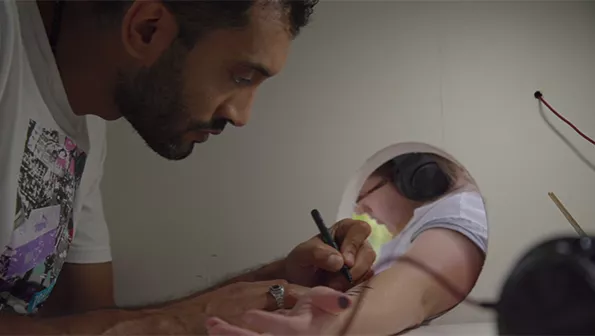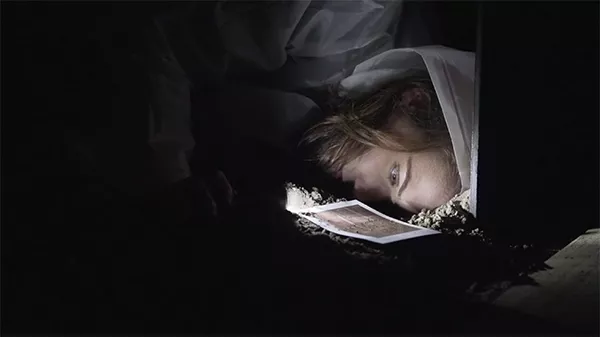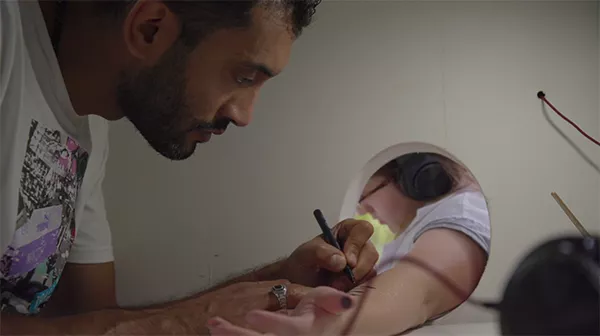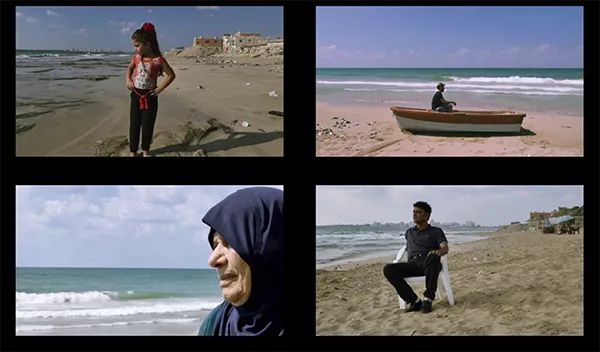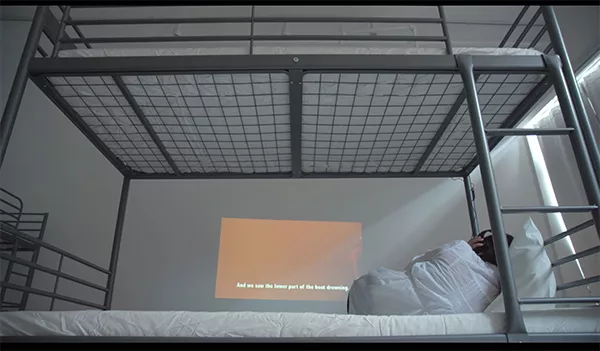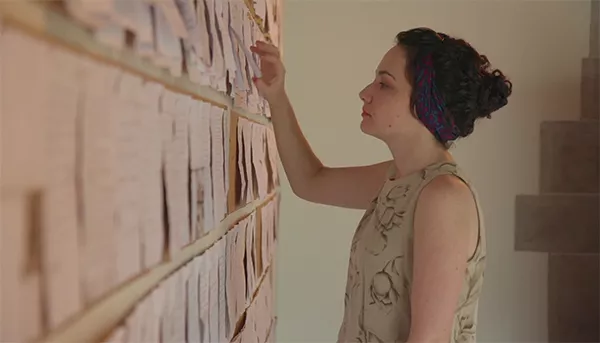'ear whispered': Artist Tania El Khoury’s Retrospective at Bryn Mawr College
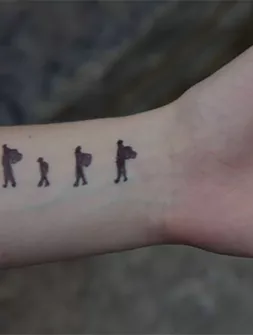
This semester Bryn Mawr College hosted the first ever retrospective of esteemed live performing artist Tania El Khoury as part of the 2018 Philadelphia FringeArts festival. ear-whispered: works by Tania El Khoury brought five of the artist’s works to the Philadelphia area, including four on campus, one of which premiered at Bryn Mawr as a commission of the College. Raised in Lebanon, where the artist continues to live part-time, El Khoury developed an artistic practice that represents marginalized and displaced refugee populations in the Middle East – especially those most directly affected by ongoing conflicts in Syria and between Israel and Palestine.This was the first time El Khoury’s work has been presented to audiences in the Philadelphia area.
El Khoury is a “live artist” which means her work is dependent on the involvement of an audience. Her installations provide multi-sensory experiences for participants, requiring them to dig into the earth or reach their arm through a hole in a wall to engage with her work’s themes of identity, migration, diaspora, and displacement. The works in ear-whispered aim to engage the audience as if in intimate conversation, even sometimes asking for their written responses in the form of letters to victims of political conflict.
One such work is the internationally acclaimed installation Gardens Speak, exhibited in Hepburn Teaching Theater from September 12-16. In Gardens Speak participants are asked to get down on their hands and knees in order to dig through dirt until they can hear a quiet voice coming from underground. The story is a form of oral history, voiced through the perspectives of families and friends of an individual killed in the early days of the Syrian uprising against the current regime. Each narration is literally unearthed by a single audience member as an improbable answer to the question, “can the dead speak?”
After experiencing an individual’s voice from the grave, each participant is asked to respond to the deceased in the form of a written letter. Overwhelmed by what to do with this growing archive of letters, El Khoury produced Tell Me What I Can Do, an installation that allowed for the display and contemplation of these handwritten documents. This work premiered at Bryn Mawr College and some of the letters from this iteration of Gardens Speak have now become part of Special Collections.
El Khoury holds a Ph.D. from Royal Holloway at the University of London and describes her artistic process as research – for Gardens Speak, this was ethnographic research through conversations with family and friends of the deceased, for Camp Pause, this was spending time in the Rashidieh Refugee Camp, meeting and interviewing residents about their lives there. For Camp Pause, she worked as part of a research and performance art collective, Dictaphone Group, that she formed with architect/urbanist Abir Saksouk. The collective collaborates with a large team of artists and researchers to build live art projects structured on intensive sociological and anthropological studies of politicized spaces.
In Camp Pause, visitors are invited to watch and listen to the stories of four residents of the Rashidieh Refugee Camp in Lebanon, where Palestinian refugees have lived since 1963. The installation, on view in the Rare Book Room of Canaday Library until December 14, surrounds visitors on four sides with simultaneously projected videos. Visitors can select from the projections, put on headphones, and listen to the voice of a resident, recounting personal observations of life in the camp. As viewers, we encounter the subjects in their homes before accompanying them to the nearby sea that borders the camp as much as the military checkpoints that surround them.
A wide range of programs accompanied the exhibition, including a weekly series of Friday Finds developed by Laurel McLaughlin (Ph.D. Candidate and Ridgway Curatorial Fellow to Special Collections) to animate the themes of memory, loss, migration, and diaspora in El Khoury’s work. This series included artists, storytellers, and poets; Bi-Co faculty from the departments of Anthropology, Archaeology, History of Art, and Political Science; as well as a student symposium on storytelling. Special lectures by Noura Erakat, human rights attorney at George Mason University, and Clare Davies, curator of contemporary art of the Middle East at the Metropolitan Museum of Art, were also featured.
Organizing ear-whispered was a massive collaborative undertaking by Tania El Khoury, Bryn Mawr College’s Performing Arts, Special Collections, Middle Eastern Studies, and Museum Studies; the Philadelphia FringeArts Festival; and the PEW Center for Arts & Heritage. The inspiration for it came from former Performing Arts Coordinator Lisa Kraus, who personally experienced Gardens Speak in London; she won financial support to bring it to campus from the PEW Center for Arts & Heritage, before partnering with Carrie Robbins (Curator & Academic Liaison for Art & Artifacts in Special Collections at Bryn Mawr College) and FringeArts. A team of nine Bryn Mawr College undergraduate interns worked closely with El Khoury during her residency and helped a small staff of dedicated project managers and professional performers run each of the “live art” works during the course of ear-whispered. These students were Rachel Adler (BMC ’21), Akili Davis (BMC ’20), Tanjuma Haque (BMC ’21), Maryam Jahanbin (BMC ’19), Claire Knight (BMC ’20), Dalia Mahgoub (BMC ’20), Talia Shiroma (BMC ’19), Mack Somers (BMC ’20), and Maya Stucky (BMC ’20). You can read some of their blog posts here.
Major support for ear-whispered: works by Tania El Khoury has been provided to Bryn Mawr College by The Pew Center for Arts & Heritage. This project is presented in association with FringeArts. Additional support is provided by Bryn Mawr College’s Middle Eastern Studies Program. Additional support for Camp Pause, and its affiliated programs, has been provided by Bryn Mawr College’s Special Collections and the Friends of the Bryn Mawr College Library.
Listen to interviews with participants, and learn more about Tania El Khoury, her work, and ear-whispered by clicking here.
